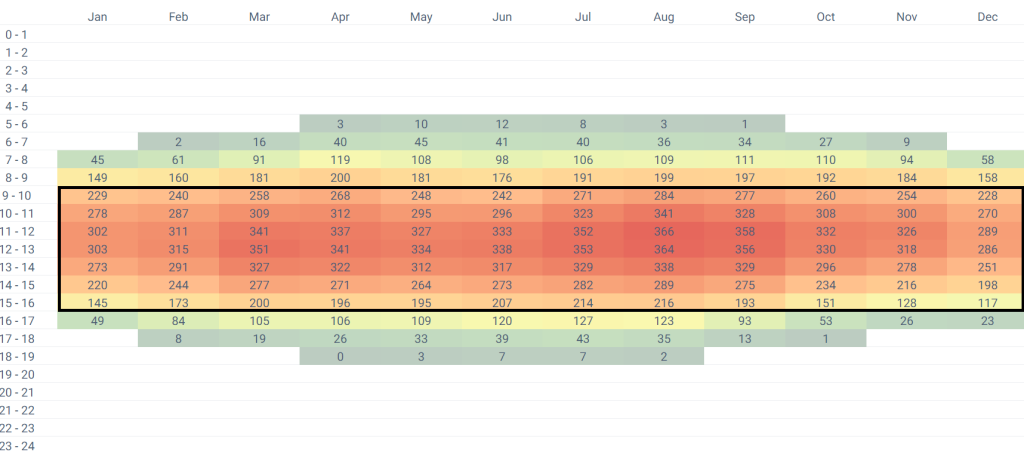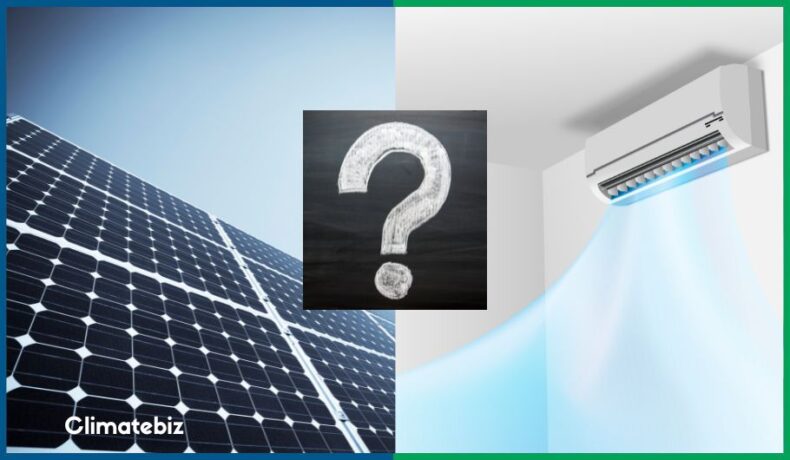AC units are costly to run, which is why many people are turning to solar panels to offset this considerable expense.
If you’re one of the 85% of American households that own an AC, it’s worth knowing this appliance accounts for 16% of your electricity bill.
From 2021 to 2022, the price of electricity increased by 15%. Because of this, you may already be spending more than $ 1,000 a year to run your AC.
Luckily, there are solutions to reduce your electricity bill, like installing a solar system. Currently, more than 3 million American homes are equipped with a solar system.
In this article, using simple calculations, we demonstrate how solar panels can power an AC. Additionally, we provide a table to help you size your solar system according to your AC unit’s power.
Table of Contents
How much energy does an AC use?
Air conditioning units are the most power-hungry domestic appliances, with larger models reaching more than 7kW.
Typically, to determine the amount of energy an appliance uses, you must multiply its rated power by the number of working hours:
Energy (kWh) = Power (kW) x Time (hour)
Unfortunately, this formula doesn’t apply to ACs. These units rarely operate continuously at full power. Instead, their compressors follow a working cycle (ON-OFF) where their duration depends on several factors, such as:
- Desired room temperature.
- Outside temperature.
- Room size.
- The AC’s efficiency.
Therefore, unlike an electric fan, you can only estimate the amount of electricity an AC uses.
The following table summarizes the average monthly energy use for different AC sizes:
| AC cooling power | Recommended room size | Average Power | Average Monthly Energy Use for new AC (source: EnergyStar) |
|---|---|---|---|
| 5,000BTU | 150sqft | 500W | 30kWh |
| 9,000BTU | 350-400sqft | 850W | 55kWh |
| 12,000BTU | 450-550sqft | 1061W | 65kWh |
| 18,000BTU | 600-1000sqft | 1500W | 85kWh |
| 24,000BTU | 1400-1500sqft | 2660W | 170kWh |
| 28,000BTU | 1500-1900sqft | 2950W | 220kWh |
Note to our readers: The cooling power of an air conditioning unit is measured in British Thermal Units BTU/h (BTU). The higher this figure, the higher the cooling capacity.
AC units also come with an Energy Efficiency Ratio (EER) rating. This rating is the ratio of an AC unit’s cooling capacity to its power.
EER= BTU / Power (W)
The higher the EER, the more efficient your AC is and the lower its energy use.
Can you power an AC with solar panels?
Solar panels are modular power systems, and commercial solar farms are commonly made of hundreds of units. Naturally, they’ll have no problem powering an AC.
However, you want to know whether a residential solar system can power an AC.
In this part, we will be studying two types of domestic solar systems:
- Grid-tied.
- Off-grid.
We’ll review their specificities and find out if they can power an AC.
Can you power an AC with a grid-tied solar system?
Solar panels are modular power systems, with commercial solar farms commonly made of hundreds of units. Naturally, they’ll have no problem powering an AC.
However, you want to know whether a residential solar system can power an AC. So, let’s look at two types of domestic solar systems:
- Grid-tied.
- Off-grid.
We’ll review their specificities and determine whether they can power an AC.
Related reading: Grid-Tied Vs. Off-Grid (What are the key differences?)
Can you power an AC with a grid-tied solar system?
In a grid-tied solar system, your solar panels and household electrical system connect to a utility company.
This configuration allows you to self-consume your solar electricity daily and sell the excess to the electricity grid.
If there is insufficient sunlight, the utility grid automatically takes over and powers your appliances.
Now, you’ve seen that an AC unit’s power varies from 500W to 3000W. Consequently, you’ll need a solar system with similar power output.
Remember, solar panels are variable power generators. In other words, their power varies relative to the time of day and year, weather, and outside temperature.
Here’s an example using a 500W solar panel in Los Angeles. Using Global Solar Atlas, we sourced the following average hourly power profile:

The average power output of a 500W solar panel between 9 AM and 4 PM is 200-366 watts. Consequently, in a grid-tied configuration, a 500W solar panel cannot directly run a 500W AC unit (5,000 BTU).
Therefore, should you want to power your AC entirely with solar, you’ll have to oversize your solar array. In the example above, a 1kW solar system will be enough to run a 500W AC unit.
If you decide not to oversize, then you can rely on your local utility grid to take over when your solar energy has run out.
Conclusion
Running an air conditioning unit with a grid-tied solar system is feasible as long as your solar system is at least 2 times more powerful than your AC.
Can you power an AC with an off-grid solar system?
An off-grid solar system is a stand-alone power generator. Typically, it combines solar panels, an inverter, and batteries.
The most important part of a grid-tied system is the amount of energy that the solar panels provide. Conversely, in an off-grid system, the emphasis is placed on panel energy production and battery storage.
Therefore, a solar battery’s size plays a significant role in an off-grid configuration.
Example
Will a 500W solar panel run an 850W AC in an off-grid solar system?
According to Global Solar Atlas, a 500W solar panel in Los Angeles produces 2.4kWh per day on average (1.9kWh during winter months and 2.6kWh during summer months).
You’ve seen that an 850W AC unit uses an average of 55kWh per month (1.84kWh per day). This figure is below a 500W solar panel’s daily production.
In the end, the solar panel’s maximum instantaneous power is always below the AC’s running power. However, the solar panel’s total energy production exceeds the AC’s energy usage. Consequently, the battery will be able to run the AC unit for the most part.
A 2kWh battery will do a great job running the 850W AC in this configuration.
Conclusion
In an off-grid configuration, running an AC unit with solar panels is feasible as long as you have the correct battery size. In this setup, the solar panels charge the battery, which powers the AC unit.
How many solar panels do you need to power an AC?
You’ll need as little as 1 x 400W solar panel to power the smallest AC unit. Pretty impressive, right?
For our calculation, we consider a solar panel’s average daily total energy production rather than its instant power.
To determine a solar panel’s daily energy production in kWh/kWp (PVOUT), you’ll need to enter your location in a solar calculator, such as Global Solar Atlas.
For example, in Los Angeles, on average, a 1kW solar system produces 4.8kWh per day, making the PVOUT 4.8.
Apply the formula below to determine the number of solar panels you’ll need to power your AC:
Number of solar panels = AC daily Energy Use(kWh) / (PVOUT(kWh/kWp) x solar panel power(kW))
The following table lists the average number of 400W solar panels you’ll need to power an AC — from 5,000 to 28,000 BTU — in the ten most populated states:
| 5,000 BTU | 9,000 BTU | 12,000 BTU | 18,000 BTU | 24,000 BTU | 28,000 BTU | |
|---|---|---|---|---|---|---|
| California | 1 | 1 | 2 | 2 | 3 | 4 |
| Texas | 1 | 2 | 2 | 2 | 4 | 5 |
| Florida | 1 | 2 | 2 | 2 | 4 | 5 |
| New York | 1 | 2 | 2 | 2 | 4 | 5 |
| Pennsylvania | 1 | 2 | 2 | 2 | 4 | 5 |
| Illinois | 1 | 2 | 2 | 2 | 4 | 5 |
| Ohio | 1 | 2 | 2 | 2 | 4 | 5 |
| Georgia | 1 | 2 | 2 | 2 | 4 | 5 |
| North Cal | 1 | 2 | 2 | 2 | 4 | 5 |
| Michigan | 1 | 2 | 2 | 2 | 4 | 6 |
Final thoughts
Installing solar panels to power an AC is the best way to save on your electricity bill.
With an average levelized cost of 6 cents/kWh (over 25 years of use), solar energy is highly competitive against utility electricity (16.6 cents/kWh in 2022).
The most common air conditioner size is 24,000 BTU. We calculated that you’d only need between 3-4 400W solar panels — depending on your location — to power this AC.
Should you have any further questions on this topic, please reach out to us in the comments section below or follow us on Twitter.

